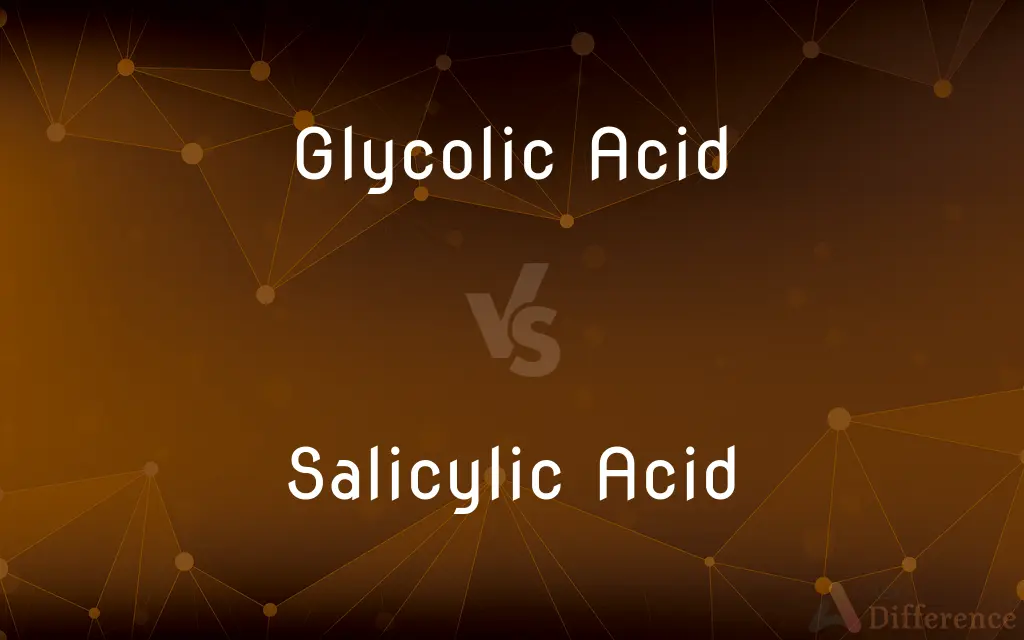Glycolic Acid vs. Salicylic Acid — What's the Difference?
By Fiza Rafique & Urooj Arif — Published on March 1, 2024
Glycolic acid, an AHA, excels in exfoliating surface skin cells for a brighter complexion, while salicylic acid, a BHA, penetrates deeply to unclog pores and reduce acne.

Difference Between Glycolic Acid and Salicylic Acid
Table of Contents
ADVERTISEMENT
Key Differences
Glycolic acid is a type of alpha-hydroxy acid (AHA) that is derived from sugar cane. It is known for its small molecule size, which allows it to penetrate the skin's surface easily. This characteristic makes it highly effective in exfoliating dead skin cells, leading to a smoother and more radiant complexion.
Salicylic acid, on the other hand, belongs to the beta-hydroxy acid (BHA) family and is sourced from willow bark. Its key property is its ability to penetrate into pores, dissolving the buildup of sebum and dead skin cells that can lead to acne. This makes salicylic acid particularly beneficial for those with oily and acne-prone skin.
Glycolic acid focuses on the upper layer of the skin to enhance texture and tone, while salicylic acid targets the deeper layers, addressing concerns like blackheads and pimples. Both acids stimulate cell turnover but in different layers of the skin, catering to various skincare needs.
Glycolic acid can be more suitable for individuals with concerns about aging, such as fine lines and uneven skin tone, due to its ability to promote collagen production. It's also beneficial for dry skin types because of its moisturizing properties.
Salicylic acid is often recommended for those struggling with oily skin and acne because it helps to regulate sebum production and has anti-inflammatory properties. Its ability to clear pores makes it a key ingredient in many acne treatments.
ADVERTISEMENT
Comparison Chart
Type
Alpha-hydroxy acid (AHA)
Beta-hydroxy acid (BHA)
Source
Sugar cane
Willow bark
Main Benefit
Exfoliates surface skin cells
Unclogs pores, reduces acne
Skin Penetration
Surface level
Deep into pores
Ideal For
Aging concerns, dry skin
Oily, acne-prone skin
Compare with Definitions
Glycolic Acid
A skin-care ingredient that exfoliates and brightens the complexion.
She uses a glycolic acid toner to achieve glowing skin.
Salicylic Acid
A beta-hydroxy acid effective in treating acne.
Salicylic acid cleansers help her manage breakouts.
Glycolic Acid
Can increase skin sensitivity to the sun.
After applying glycolic acid, she never forgets sunscreen.
Salicylic Acid
Can help regulate skin's oil production.
Using salicylic acid has balanced his skin's oiliness.
Glycolic Acid
Suitable for dry and mature skin types.
He incorporated glycolic acid into his routine for its moisturizing benefits.
Salicylic Acid
Known for its ability to penetrate and clear pores.
He uses a salicylic acid spot treatment for his blackheads.
Glycolic Acid
Derived from sugar cane, known for anti-aging properties.
Glycolic acid serums are popular for reducing fine lines.
Salicylic Acid
Often found in acne treatments due to anti-inflammatory properties.
Salicylic acid reduces the redness of her pimples.
Glycolic Acid
Works by loosening the bonds between dead skin cells.
Glycolic acid peels offer quick results by removing dull skin.
Salicylic Acid
Suitable for oily and acne-prone skin types.
Her oily skin benefits from salicylic acid's sebum-regulating properties.
Common Curiosities
Can salicylic acid and glycolic acid be used together?
Yes, they can be used together but with caution to avoid over-exfoliation and irritation. It's best to alternate their use or apply them at different times of the day.
What is glycolic acid best for?
Glycolic acid is best for exfoliating the skin, reducing signs of aging, and improving skin texture and tone.
Is salicylic acid good for all skin types?
Salicylic acid is particularly beneficial for oily and acne-prone skin types. It may be too drying for very dry skin.
Can glycolic acid help with acne?
Glycolic acid can help with acne by exfoliating dead skin cells that clog pores, but salicylic acid is more effective for deep pore cleansing.
Is glycolic acid safe for sensitive skin?
Glycolic acid can be used on sensitive skin if introduced slowly and in lower concentrations to monitor for irritation.
Does salicylic acid remove acne scars?
Salicylic acid can help fade acne scars by promoting skin cell turnover but may not eliminate deep scars.
Does salicylic acid lighten skin?
Salicylic acid can help to brighten the complexion by removing dead skin cells but does not lighten the skin beyond its natural tone.
Is it okay to use salicylic acid every day?
Depending on the product and your skin type, salicylic acid can be used daily, but it's important to monitor for signs of irritation.
How often should you use glycolic acid?
Frequency of use depends on the product's concentration and your skin's tolerance. Start with once or twice a week, increasing as tolerated.
Does glycolic acid make skin thinner?
No, glycolic acid does not make the skin thinner. It removes dead skin cells, which can actually strengthen the skin's barrier over time.
Can glycolic acid cause breakouts?
Initial use of glycolic acid may cause purging, where increased cell turnover leads to temporary breakouts.
How long does it take for glycolic acid to work?
Visible improvements with glycolic acid can often be seen within a few weeks of regular use.
Can you see results immediately with salicylic acid?
Some immediate improvement may be noticeable, but consistent use over weeks is typically required for significant results.
Can I stop using salicylic acid once my acne clears?
While you can reduce usage, maintaining a routine with salicylic acid can help prevent future breakouts.
Is glycolic acid or salicylic acid better for wrinkles?
Glycolic acid is generally better for treating wrinkles due to its ability to stimulate collagen production and exfoliate the skin.
Share Your Discovery

Previous Comparison
Amazon Prime vs. Twitch Prime
Next Comparison
Technology of Education vs. Technology in EducationAuthor Spotlight
Written by
Fiza RafiqueFiza Rafique is a skilled content writer at AskDifference.com, where she meticulously refines and enhances written pieces. Drawing from her vast editorial expertise, Fiza ensures clarity, accuracy, and precision in every article. Passionate about language, she continually seeks to elevate the quality of content for readers worldwide.
Co-written by
Urooj ArifUrooj is a skilled content writer at Ask Difference, known for her exceptional ability to simplify complex topics into engaging and informative content. With a passion for research and a flair for clear, concise writing, she consistently delivers articles that resonate with our diverse audience.











































